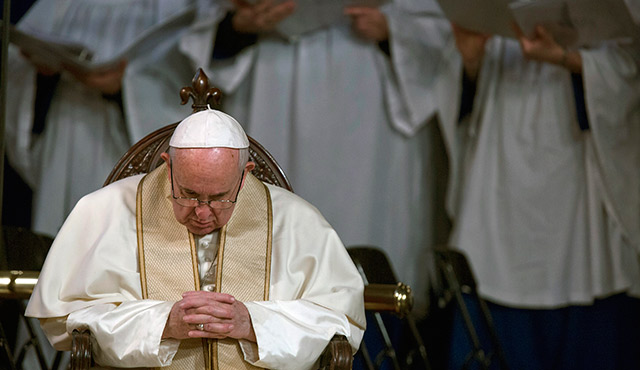In 1 Thessalonians 5:17, St. Paul urges Christians to “pray without ceasing.” The passage, though short, is a significant message for Christians on the importance of cultivating a relationship with God through prayer.
St. Paul’s message meant that being in a state of constant prayerfulness requires an awareness that God is always with us and that He is also engaged in every thought and action.
Fr. Christopher Smith, episcopal vicar and rector of Christ Cathedral, says that there is often a misunderstanding of what true prayer requires.
“Prayer is not a way to get God to do something. Prayer is a way of acknowledging to God our reliance on Him,” Fr. Smith explains. “We go to God in various circumstances of our lives whether they’re positive or challenging and the prayer is an expression that we are relying on God and confident that in the midst of whatever happens, that God is present with us. That’s what God’s will is. It doesn’t mean that God wills that someone be sick and others be well. That’s a misunderstanding.”
Fr. Smith elaborates that God’s will is that we are in right relationship with each other, that we are living good lives and that we’re being honest, fair and reconciliatory.
“The prayer of petition really properly has to be understood from that angle,” he says. “Otherwise people end up thinking that God isn’t with them because what they wanted didn’t happen.”
Fr. Smith acknowledges that it’s one part of his job that he finds difficult in helping people to understand.
“It’s so hard as a priest when people are upset that what they wanted didn’t happen and they think that God made the bad thing happen,” he said. “I tell them that I understand your disappointment, I understand your grief, I understand your anger that the outcome didn’t go the way you were hoping, but have confidence that God is always with you in the midst of what you went through and helped you through it.”
Pia de Solenni, theological consultant to the Office of the Bishop, explains that there are two essential elements in a prayer.
“I think what’s missing a lot of the time is the love story aspect of prayer and that prayer really should be a love story,” explains de Solenni. “We should want to spend time with God just as we would with anybody that we love. And we don’t come to love someone unless we get to know them. If we don’t yet love God in this way, it’s a sign that we haven’t been spending the time getting to know Him.”
She adds listening is also an important aspect of prayer.
“I think we’ve been taught the petition part very well. We’re in the habit of either asking God or telling God and that makes for a very one-sided relationship.”
De Solenni recommends that one of the easiest ways to start cultivating a prayerful relationship with God is by setting aside three to five minutes each morning.
“Use maybe a reminder on your phone that you’ll pray for those few minutes. That’s the time you would put your phone on silent or airplane mode. Do whatever you need to do to have those few minutes,” she said.
She added that one of the best pieces of advice she received from her spiritual director is to read the daily Mass readings the night before.
“There’s all sorts of services online where these can be delivered to your inbox or download an app that pops up with a notification of the daily readings,” says de Solenni. “Just have it at your fingertips. Maybe the three minutes in the morning you can say this is your day Lord, tell me what you want me to do with it and how I can serve you. And then end the day focusing on the Mass readings. Even if you don’t have the opportunity to go to Mass you know those readings are so important,” said de Solenni. She referenced a quote from St. Jerome, which says, “Ignorance of Scripture is ignorance of Christ.” The adage puts the importance of scriptures into perspective.
Fr. Smith recommends “prayer on the run,” which is another approach Christians can use to build their relationship with God.
“Everyday, there is a lot going on around us. There is much to stimulate our senses of sight, sound, smell and taste,” he explains. “Prayer on the run is about letting the stimulus around us call us to little moments of prayer.”
He says that one example is how the sound of sirens can initiate a prayer for the person in distress and for the emergency personnel trying to help.
“These little moments of prayer on the run can inspire us to want to spend bigger chunks of time with God.”


